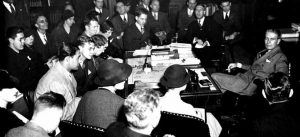Adam Waters and EJ Dionne, Jr. in Dissent:
 Donald Trump campaigned for the presidency and continues to govern as a man who is anti-intellectual, as well as anti-fact and anti-truth. “The experts are terrible,” Trump said while discussing foreign policy during the 2016 campaign. “Look at the mess we’re in with all these experts that we have.” But Trump belongs to a long U.S. tradition of skepticism about the role and motivations of intellectuals in political life. And his particularly toxic version of this tradition raises provocative and difficult questions: Are there occasions when anti-intellectualism is defensible or justified? Should we always dismiss charges that intellectuals are out of touch or too protective of established ways of thinking? In 1963 the historian Richard Hofstadter published Anti-Intellectualism in American Life, in which he traced a recurring mode of thought prevalent, as he saw it, in U.S. religion, business, education, and politics. “There has always been in our national experience a type of mind which elevates hatred to a kind of creed,” he wrote. “[F]or this mind, group hatreds take a place in politics similar to the class struggle in some other modern societies.” On the list of widely hated groups were Masons, abolitionists, Catholics, Mormons, Jews, black Americans, immigrants, international bankers—and intellectuals.
Donald Trump campaigned for the presidency and continues to govern as a man who is anti-intellectual, as well as anti-fact and anti-truth. “The experts are terrible,” Trump said while discussing foreign policy during the 2016 campaign. “Look at the mess we’re in with all these experts that we have.” But Trump belongs to a long U.S. tradition of skepticism about the role and motivations of intellectuals in political life. And his particularly toxic version of this tradition raises provocative and difficult questions: Are there occasions when anti-intellectualism is defensible or justified? Should we always dismiss charges that intellectuals are out of touch or too protective of established ways of thinking? In 1963 the historian Richard Hofstadter published Anti-Intellectualism in American Life, in which he traced a recurring mode of thought prevalent, as he saw it, in U.S. religion, business, education, and politics. “There has always been in our national experience a type of mind which elevates hatred to a kind of creed,” he wrote. “[F]or this mind, group hatreds take a place in politics similar to the class struggle in some other modern societies.” On the list of widely hated groups were Masons, abolitionists, Catholics, Mormons, Jews, black Americans, immigrants, international bankers—and intellectuals.
Hofstadter’s skepticism of mass opinion—on both the left and the right—came through quite clearly. “[T]he heartland of America,” he wrote, “filled with people who are often fundamentalist in religion, nativist in prejudice, isolationist in foreign policy, and conservative in economics, has constantly rumbled with an underground revolt against all these tormenting manifestations of our modern predicament.” It is not an accident that these words sound familiar in the Trump era. A liberalism that viewed the heartland with skepticism was bound to encourage the heartland to return the favor.
More here.
